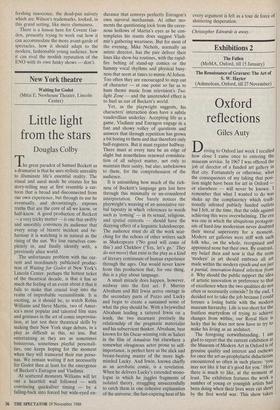New York theatre
Waiting for Godot (Mitzi E. Newhouse Theater, Lincoln Center)
Little light from the stars
Douglas Colby
The great paradox of Samuel Beckett as a dramatist is that he uses stylistic unreality to illuminate life's essential reality. The visual and aural mode he creates for his story-telling may at first resemble a car- toon that is broad and disconnected from our own experience, but through its use he eventually, and devastatingly, exposes truths fhat are the core of all we know, or half-know. A good production of Beckett — a very tricky matter — is one that swiftly and smoothly convinces its audience that every scrap of bizarre incident and be- haviour it is watching is as natural as the rising of the sun. We lose ourselves com- pletely in, and finally identify with, a previously alien world.
The unfortunate problem with the cur- rent and inordinately publicised produc- tion of Waiting for Godot at New York's Lincoln Center, perhaps the hottest ticket of the theatrical decade, is that it has so much the feeling of an event about it that it fails to make that crucial leap into the realm of improbable verisimilitude. It is exciting, as it should be, to watch Robin Williams and Steve Martin, two of Amer- ica's most popular and talented film stars and geniuses in the art of comic improvisa- tion, at last test their theatrical skills by making their New York stage debuts, in a play as difficult as this, no less. But entertaining as they are as sometimes boisterous, sometimes playful personali- ties, one keeps hoping for the moment when they will transcend their star perso- nas. We remain waiting if not necessarily for Godot then at least for the emergence of Beckett's Estragon and Vladimir.
At scattered moments Williams will let out a heartfelt wail followed — with convincing quicksilver timing — by a falling-back into forced but wide-eyed en- durance that conveys perfectly Estragon's own survival mechanism. At other mo- ments the questioning look from the caver- nous hollows of Martin's eyes as he con- templates his stastis does suggest Vladi- mir's gathering weariness. But for most of the evening, Mike Nichols, normally an astute director, has the pair deliver their lines like show-biz routines, with the rapid- fire belting of stand-up comics or the hammy vocal rhythms and physical busy- ness that seem at times to mimic Al Jolson. Too often they are encouraged to step out of character — at one point so far as to hum theme music from television's Twi- light Zone — and the unintended effect is to hurl us out of Beckett's world.
Yet, as the playwright suggests, his characters' interaction does have a subtle vaudevillian underlay. Accepting life as a game, Vladimir and Estragon engage in a fast and showy volley of questions and answers that through repetition has grown a bit boring to them and that therefore only half-registers. But it must register halfway. There must at every turn be an edge of slight but nonetheless renewed considera- tion of all subject matter, not only to maintain their sanity, but also, unbeknown to them, for the comprehension of the audience.
It is astonishing how much of the rich- ness of Beckett's language gets lost here through this minimally or un-considered interpretation. One barely notices the playwright's weaving of an associative ver- bal tapestry in which references to words such as 'coming' — in its sexual, religious, and spatial contexts — should have the dizzying effect of a linguistic kaleidoscope. The audience must do all the work sear- ching for the echoes of other writers such as Shakespeare (`No good will come of this') and Chekhov (`Yes, let's go.' They do not move) that exist in the play as a kind of literary continuum of human experience through the ages. One would never know from this production that, for one thing, this is a play about language.
A small miracle does happen, however, midway into the first act. F. Murray Abraham and Bill Irwin arrive onstage in the secondary parts of Pozzo and Lucky and begin to create a sustained sense of what the play should be. With a bejewelled Abraham leading a tattered Irwin on a leash, the two incarnate precisely the relationship of the pragmatic materialist and his subservient thinker. Abraham, best known for his Oscar-winning role as Salieri in the film of Amadeus but elsewhere a somewhat oleaginous actor prone to self- importance, is perfect here as the slick and breast-beating master of the more high- minded Lucky. And Irwin, known chiefly as an acrobatic comic, is a revelation. When he delivers Lucky's extended mono- logue in which he juggles fragments of isolated theory, struggling unsuccessfully to catch them in one cohesive explanation of the universe, the fast-expiring heat of his every argument is felt as a tour de force of shattering desperation.
Christopher Edwards is away.






















































 Previous page
Previous page